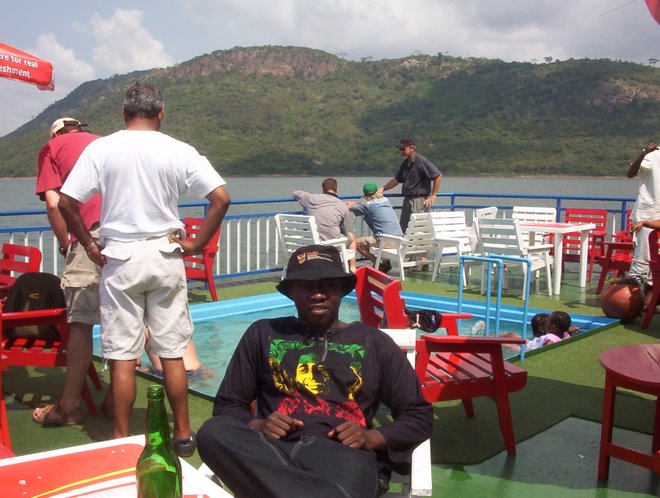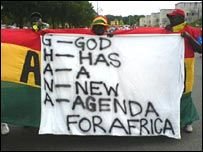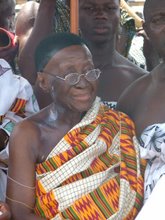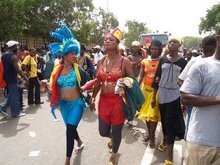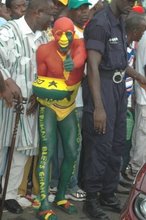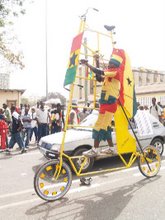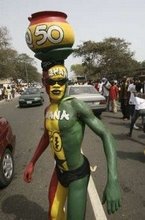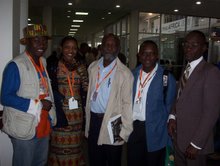KMA determined to sustain decongestion exercise in Kumasi
THE Kumasi Metropolitan Assembly (KMA) has intensified efforts to sustain the decongestion exercise it undertook at the central business district (CBD) of Adum and the streets at the Kajetia and Central markets three weeks ago.
The KMA has deployed 80 prison and police officers and metropolitan guards and officers from the Mental AIDS Foundation to maintain sanity in those areas.
The traders were ejected from the streets in line with the KMA’ determination to decongest the streets and pavements of the CBD, Kajetia and Central markets to enhance free pedestrian and vehicular movement.
About three years ago, the KMA commenced a similar exercise to eject hawkers and petty traders from the pavements and streets of the CBD but the traders returned to the streets two weeks later, negating the whole exercise.
Prior to their return, the traders caused a stir in Kumasi by taking to the streets and converging at the Ashanti Regional Co-ordinating Council, urging the then Ashanti Regional Minister, Mr Sampson Kwaku , to intervene to enable them return to the streets to transact business.
The traders contended that the KMA did not earmark any area for them to transact their businesses before ejecting them and, therefore, appealed to the regional administration to intervene, threatening to boycott future elections if their requests were not met.
The traders also succeeded in winning public sympathy and, therefore, returned to the streets a few days after the earlier decongestion exercise.
Their action made some residents criticise the KMA for what they described as inactivity and negligence.
Consequently, when the assembly embarked on the recent exercise, the chorus among some of the affected traders in Kumasi was the usual “ we will soon return to the streets as soon as the tempo of the KMA cools down, to continue business”.
The view of the public is that the KMA should sustain the exercise. A number of people interviewed said “ it is too risky for commuters to use the principal streets in the metropolis as a result of the commercial activities on the main pavements and parts of the streets, especially at the CBD”.
The Kumasi-Takoradi Chairman of the Ghana Private Road Transport Union (GPRTU), Alhaji Sumaila Boache, also told the Daily Graphic that the KMA had been too lenient with the traders by allowing them to transact business on the streets.
He said while the KMA was eager to arrest and prosecute offending drivers who flout traffic regulations, they were reluctant to punish traders who take the laws into their hands.
On her part, a 30-year-old trader, Ms Cynthia Asante, who was affected by the exercise said notwithstanding her predicament, the KMA should continue with the exercise “ because it has brought sanity into the streets of Kumasi and reduced the risk of sharing the streets with vehicles”.
She said she was forced to do business in the streets to earn a living but with the present situation, it was important for her to relocate.
“ The exercise should not become a nine-day wonder as it was with the previous exercises” she said, adding “ It is time the KMA implements its decisions dispassionately to enable citizens live up to their civic responsibilities”.
According to Ms Asante, the KMA should continue to deploy some officers on the road to educate the public on the need to use the pavements instead of using the roads as a walkway.
She, however, urged the KMA to respond to the needs of some of the affected traders by developing the Race Course area to resettle the affected traders.
Explaining, she said when the KMA started the ejection exercise a few years ago, they gave the assurance that the Race Course area would be developed to enable some of the affected traders move there for their business transactions and prevent them from returning to the main pavements and streets “ but to date, nothing has been done”.
“ The place is too muddy, bushy and unhygienic for any business transactions, so my plea is that the KMA should develop the area to enable some of us move there to make a living”, she pleaded.
When the Asantehene, Otumfuo Osei Tutu II, toured some project sites in Kumasi last week, he took time to inspect the streets and commended the KMA for “ bringing sanity into the CBD”.
Advising the affected traders, Otumfuo Osei Tutu said “ there is no need for you to play politics with this exercise because your actions have brought much congestion and problems in Kumasi, and the time has come for you to respect the orders of the KMA to bring sanity into Kumasi.
He said customers would follow the traders wherever they went to transact business with them, stressing that their absence from the streets would enhance the beautification exercise currently underway in the metropolis.
Speaking to the Daily Graphic, the Public Relations Officer of the KMA, Mrs Jemima Nancy Asare, said at the moment, the KMA was spending ¢50, 000 a day on each of the 80 officers who were monitoring the area.
“ They are doing a good job of maintaining law and order, so we are not worried about spending ¢50, 000 a day to maintain them on the streets and pavement”, she noted, adding, “ they were brought there principally to prevent any of the traders from returning to the area for business, and so far, they have done an excellent job.
Mrs Asare said since the exercise started, about 30 traders who flouted the KMA’s orders and decided to return to the streets and pavements to do business had been arrested.
“ They are being prosecuted to serve as deterrent to others”, she said, adding “ under no circumstance would we allow the traders to return to the pavements and streets to cause any congestion”.
She noted further that special courts had already been prepared to deal with recalcitrant traders and advised the affected traders to relocate to Bantama, Asafo Market, Patase Estate, Kwadaso Estate and Amakom Market where some areas had been developed for them.








